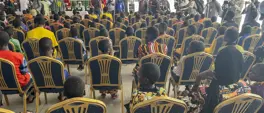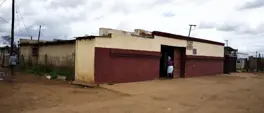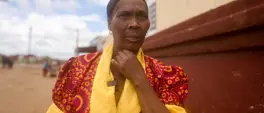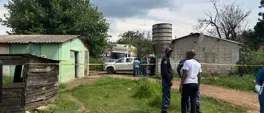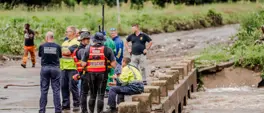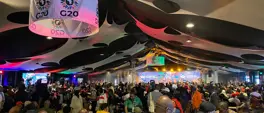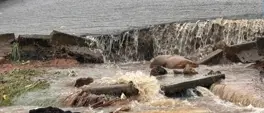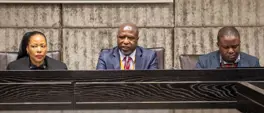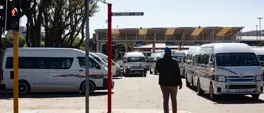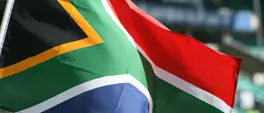MALAIKA MAHLATSI: I support my govt – what is happening in Gaza is genocide
Malaika Lesego Samora Mahlatsi
4 January 2024 | 10:00As South Africa prepares to stand before the ICJ in defence of international law and of human rights, I could not be more proud of my government, writes Malaika Mahlatsi.
A week ago, South Africans woke up to breaking news that the government had filed a case at the International Court of Justice (ICJ) alleging that the state of Israel is engaging in genocidal acts in Gaza.
The application, which has been confirmed by the United Nations (UN) court and will be heard on the 11th and 12th of January 2024, contends that Israel is committing human rights violations under the United Nations Convention on the Prevention and Punishment of the Crime of Genocide, commonly referred to as the Genocide Convention.
The Genocide Convention was conceived in response to the Second World War, where atrocities such as the Holocaust, the genocide of European Jews, lacked an adequate legal definition. By the time the Second World War took place, there were already multilateral treaties that addressed the conduct of warfare – the Hague Conventions of 1899 and 1907.
These international treaties and declarations were among the first formal statements outlining the laws of war and war crimes. However, these conventions did not provide an adequate description or legal definition of genocide – something that would only happen three years after the devastating Second World War.
Following the Holocaust, the term “genocide” was defined using a specific set of criteria in the Genocide Convention, which, as of January 2024, has been adopted by 152 of the 193 member states of the UN.
The convention defines genocide as “any of the acts committed with intent to destroy, in whole or part, a national, ethnical, racial or religious group, such as (a) killing members of the religious group; (b) causing serious bodily or mental harm to members of the group; (c) deliberately inflicting on the group conditions of life calculated to bring its physical destruction in whole or in part; (d) imposing measures intended to prevent births within the group and; (e) forcibly transferring children of the group to another group”.
Victims of genocide are not random – they are targeted on account of their membership to a group, whether such membership is real or perceived. The Convention deems as criminal complicity, incitement, and the attempt to pursue the commission of genocide and prohibits member states from engaging genocide. Significantly, the Convention also obligates member states to pursue the enforcement of the prohibition of genocide through the instrument of the ICJ.
South Africa, a founding member state of the UN, has correctly hurled the state of Israel to the ICJ as a result of the ongoing genocide occurring in Gaza.
There can be no question that based on the set of criteria outlined in the Genocide Convention, what is occurring in Gaza and other parts of occupied Palestine is a genocide.
The Israeli state has vowed to intensify its attacks on Palestinians, which it conveniently refers to as attacks on Hamas – a political and military organisation governing the Gaza Strip of the Israeli-occupied Palestinian territories. But it is not Hamas that is under attack, it is the entire Palestinian population.
According to Al Jazeera, more than 22,000 Palestinians have been killed by Israel in Gaza, with a majority of them being women and children. Nearly 60,000 people have been seriously injured, and over a million displaced.
And yet, just a few days ago, on Christmas morning, Israeli Prime Minister Benjamin Netanyahu told members of his party that the Israeli military campaign in Gaza was far from over. The Israeli state has inflicted on the Palestinian people a life calculated to being physical and economic destruction, with access to water, farmland, electricity, food, and even medical treatment being affected.
The killing of women and children, achieved through the targeted attacks on hospitals and refugee centres, is intended not only to wipe out Palestinians, but to also prevent the continuation of its population. What is happening in Palestine is genocide.
There is a narrative that seeks to suggest that the South African government should not hold Israel accountable for the genocide in Palestine because we have many unresolved problems of our own in South Africa, many of which the government is failing to resolve.
Such an argument ignores the fact that our own democracy as a country was attained precisely because countries that had their own problems to resolve decided to make apartheid a problem.
During apartheid in South Africa, countries facing serious challenges stood with us, going as far as to place their own citizens in danger. This is especially true of frontline states, particularly Lesotho, Mozambique, Zambia, Angola, and Tanzania, whose citizens were subjected to raids and bombings by South African state security.
Countries such as Nigeria issued passports to South Africans to enable them to escape the clutches of the brutal regime, and even went as far as to implement a tax on its citizens aimed at funding national liberation movements in South Africa.
If these countries had adopted the “We have our own problems, so South Africa must resolve its own apartheid problem”, I would still be in Soweto in a house without running water and electricity, attending a school without textbooks, and spending my afternoons playing on unpaved roads in the shadow of South African Defence Force (SADF) patrolling vehicles. Or perhaps, I would be in prison being tortured and starved.
Another narrative seeks to suggest that the stance taken by the South African government is populism. But there is nothing populist about South Africa’s stance on Israel.
Successive democratic governments have been consistent in their criticism of the Israeli state over the years. It is for this reason that there has been no South African ambassador in Israel for half a decade, and that following the genocide in late 2023, diplomats were recalled from Israel.
Our country’s decisions on Israel are neither populist nor convenient. In fact, the opposite is true. These decisions have not been without a significant impact on the country, particularly as South Africa is Israel’s biggest trading partner on the African continent.
In 2021, trade between Israel and sub-Saharan Africa reached over US$750 million. Most of this was machinery, electronics, and chemicals. Almost two-thirds of this trade was with South Africa.
We could benefit greatly from maintaining good relations with Israel, a country that has the unwavering support of Western nations that control some of the world’s biggest economies. But by taking Israel to the ICJ, we are making the uncomfortable decision to suffer for the Palestinian cause – a cause that we know too well because in the not-too-distant past, we were the ones on the receiving end of a genocide.
As South Africa prepares to stand before the ICJ in defence of international law and of human rights, I could not be more proud of my government.
I am honoured to be a citizen of a country that, despite its own problems, is prepared to fight on the side of a people who have been persecuted and subjected to the tyranny of apartheid.
It gives me hope that someday, from the river to the sea, Palestine will be free.
Malaika is a geographer and researcher at the Institute for Pan African Thought and Conversation at the University of Johannesburg. She is a PhD candidate at the University of Bayreuth, Germany.
Get the whole picture 💡
Take a look at the topic timeline for all related articles.
